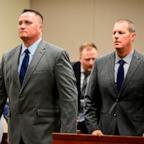Five things every player needs to know about a coaching change
— -- When the Philadelphia Eagles fired Chip Kelly in advance of their final game of the 2015 season, there was some chirping coming out of the locker room on the head coach's desire for power and his unwillingness to mesh with the players. I get it. Players talk. It happened back when I was playing for the Redskins, and Steve Spurrier got fired.
Players can say whatever they want, but the reality of a coaching change is pretty simple: You could be next.
With Kelly out, Tom Coughlin resigning and openings in Miami, Tennessee, San Francisco and Cleveland, players all over the league are in for a reality check.
Here's a quick guide to what players should prepare for when a new sheriff arrives in town.
You're not protected anymore
When the head coach is tossed, the general manager is often right behind him. That might be exciting for the fan base, but for the players still on the current roster -- the holdovers -- it's normal to get a little nervous.
Remember, these guys were hand-picked by the former regime, brought in via free agency or the draft to fit a system or a specific type of football culture. But all that stuff is gone. And so is that sense of security for players. You don't have any buddies left in the building. Instead, you are now the guys who will eventually be replaced.
When Joe Gibbs replaced Spurrier in D.C., our locker room was gradually flipped upside down as Mr. Snyder spent money on new players like it was a casual game of Monopoly, and the draft ushered out more vets in the spring. By the time we got on the field for mini-camp, there were an endless amount of new names you had to learn. And sometimes they were lining up right next to you.
Sure, the productive quarterback isn't going anywhere, and some vets will hang around while the young guys develop. But for many guys on that roster, it's time to prepare for that phone call in early March. You know, the one with the new head coach telling you to pack your bags. It's a business. And sooner or later, everyone is replaceable.
Get tight with position coaches
If you do get to hang around for the following season -- or at least through the offseason workouts -- the ability to build trust with your new position coach is vital. Remember: when the head coach is fired, his entire staff is usually let go too.
From the secondary coach to the offensive line coach, these are the men you spend the most time with throughout the year. That includes meetings and on-field work. There is a very obvious trust factor there, a player-to-coach relationship that must be built over time and in adverse situations. It's a two-way street for sure, but with a new position coach, vets have to hit the reset button and be willing to adapt to new techniques, a new voice and a new way of teaching.
Loved working with your former position coach? I hear ya. That stings when he's gone. But it's time to act like a pro and jump on the train if you want to stick around. Even if you're not a true fit for the system, or have a very limited skill set like I did (stiff as heck), show the ability to learn the new system and the new techniques. It might help keep you around.
Hey, I saw a guy get cut during meetings. I mean, seriously, he was told to leave when we were watching film during camp the year after Spurrier left. You want to talk about a dead silent room? Man. He kept sticking his eyes in the backfield on play action. Coach must have had enough of it, I guess.
School is back in session
Those old route concepts, red zone coverages and zone blitzes the roster holdovers can draw up in their sleep are going to be replaced by a new playbook with new terminology and new adjustments. The first day of the offseason is very similar to the first day of high school. Along with meeting your new teammates who have replaced half of your buddies in the locker room, there is a steep learning curve ahead.
Yes, everyone pretty much runs the same stuff in the NFL, but the new terminology can be a nightmare. I'm talking about simple things, such as personnel identification -- 11 personnel is now called "Posse"? OK. That's going to change, as is the way the play or concept is called in the huddle. Players must be ready to study hard again and spend more time in the film room seeing how these schemes actually play out on the field. Think about basic checks, or the "Omaha" call made famous by Peyton Manning that has 32 different meanings in 32 different NFL playbooks. You get a complex defensive system dropped in your lap, and you will have some long, long days at the facility trying to learn the 10 different adjustments used in Cover 7. And that's when the offense lines up in static formations. Just wait until someone goes in motion. Yikes.
When I first saw Gregg Williams' defensive playbook back in the 2004 offseason, I went from an undergrad elective course to graduate school advance theory class. That thing was deep and my offseason was spent trying to figure out the complexity of his pressure packages. Welcome to class, son.
Every day is an interview
With a new head coach, you are now auditioning for a roster spot. That basically means you are interviewing -- daily -- for the right to keep your job. Accountability is at an all-time high, and every rep, every lift in the weight room, every meeting is under the microscope.
You can't bust on the field during offseason practice sessions or show the inability to implement the new schemes or techniques being taught. That stuff might have worked in the past for vets who were getting a free ride from the former coaching staff or young players still developing. But those days are history.
The little things are going to change
To install a new winning culture in the building, plenty of what you grew accustomed to as a player is going to change. Maybe it's the way you dress on the plane, the time of the day you practice, what you eat at team meals, the structure your game plan sessions -- nothing is off-limits.
No one likes to run 300-yard shuttles on the first day of camp, right? Well, that might be the new thing this year. Some coaches like to give veterans a few days off during camp. Maybe those are gone, replaced by much more physical and taxing sessions in the August heat.
Under Gibbs, we did 9-on-7 (inside run drill) with no running back. What? That's right. As a safety, you had to track the lead blocker and run into him for 12 to 15 reps. It was like that first practice session with Norman Dale in "Hoosiers." Old-school stuff.
But you know what? You do it because the program you played under the previous year wasn't cutting it. More importantly, you like game checks. And they start coming on the second Tuesday of the regular season. You want one? I did. Then impress the new staff, make the team and hang around for another year or two before you get sent packing.
ESPN.com NFL analyst Matt Bowen played seven seasons as a defensive back in the NFL.




